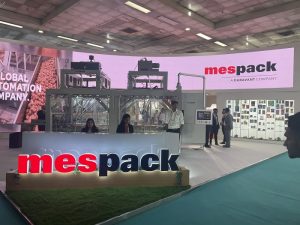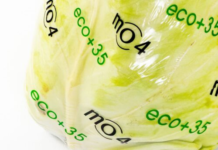
Mespack has been operating in India for about 12 years with its innovative packaging solutions for the food and beverage, pharmaceuticals, personal care, home care, and pet food industries. The company showcased its American Box – MCP 2 for secondary packaging at the PackMach Expo held from 4 – 6 October at New Delhi’s Pragati Maidan.
The American Box – MCP Series is an automatic American box machine with an integrated robotic picking system. Designed for the flexible packaging market, this secondary packaging machine is aimed at the RSC market. It is equipped with Delta Robot and full servo and up to 4 picking modules are available to increase the production speed.
Initiated in India in 2011, Mespack is going strong and increasing its portfolio with primary as well as secondary equipment. “The MCP 2 is a versatile machine for pouches as well as for cartons. When it comes to secondary packaging, if you increase efficiency and productivity, manpower can’t hold it for long. As a result, there is a need for automation as a second level. As Industry 4.0 and AI are coming into the picture, a completely automated line is very necessary. Catering to huge manpower, automation solves everything – Zero breakdowns, you can run the equipment 365 days a year, and no loss of manpower. The FMCG company can churn its money and sell the products throughout the year,” Ryan D’souza, executive – sales and operations at Mespack told Packaging South Asia.

In 2015, Mespack was taken over by a company named Duravant, which has the biggest packaging umbrella around the globe, D’souza said. Duravant has around 18 to 20 companies already in its basket. “As a result, we have a bigger umbrella having packaging machines, food processing and material handling equipment for warehousing. We deal in primary and secondary equipment such as VFFS, HFFS and end-of-line equipment,” he said.
Mespack India has been in collaboration with Ulma Packaging for flow wrapping, and thermoforming equipment for 12 years, he said. “It is growing at an exponential scale because there is a need for automation in the market. After the advent of Covid, due to the loss of manpower, a lot of FMCG companies suffered a loss of revenue. This resulted in a greater need for automation in India. In a way, Covid was a boon for the packaging sector, which came up with a completely automated line so that FMCG companies would benefit in revenue and manpower savings,” he concluded.










